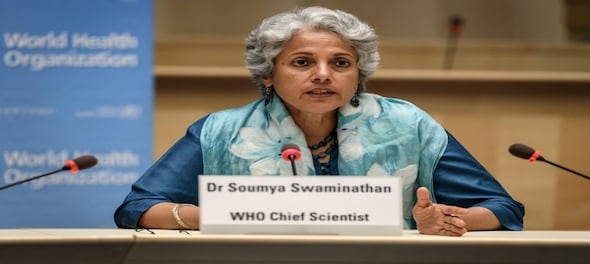
Some countries may see "another wave of infections" due to the XBB subvariant of Omicron, said Dr Soumya Swaminathan, the chief scientist at the World Health Organization (WHO).
However, Swaminathan clarified that there was no data from any country to suggest that these new variants are clinically more severe. She said this while speaking on the sidelines of the annual general meeting of the Developing Countries Vaccine Manufacturers Network (DCVMN) in Pune on Thursday.
She suggested that among over 300 subvariants of Omicron, the XBB subvariant is of concern right now. She explained: XBB "is a recombinant virus. We had seen some recombinant viruses earlier. It is very immune-evasive, which means it can overcome the antibodies. So, slightly that we may see another wave of infections in some countries because of XBB".
Other variants in WHO's radar
Swaminathan added that the WHO is tracking derivatives of BA.5 and BA.1 - which are also more transmissible and immune-evasive. "As the virus evolves, it is going to evolve more and more transmissible," she was quoted by the news agency PTI as saying.
"As of now, there is no data from any country to suggest these new subvariants are more clinically severe," she clarified.
COVID still a 'public health emergency'
Swaminathan said 8,000 to 9,000 deaths are being reported every week worldwide due to the infection. "So we have not said that the pandemic is over, which means that all precautions and tools continued to be used. The good thing is that we now have many tools; the most important thing is vaccines," she added.
Several deaths from elderly groups were seen when Omicron spread as they were not fully vaccinated.
More risks of contracting COVID-19 infection
"Many people think that it is just like the flu or any other respiratory infection, but more and more data is coming out on how COVID affects all organ systems and not just the respiratory route. It also affects the cardiovascular system and the inflammatory environment. So we have seen the risk of diabetes doubling, we have seen the risk of heart attacks...and other neurocognitive problems," Swaminathan added.
How to avoid COVID spread
Swaminathan said monitoring and tracking are the key steps. "We have seen that testing has gone down across countries, and the genomic surveillance has also gone down over the last few months. We need to maintain at least a strategic sampling of genomic surveillance so that we can keep tracking the variants as we have been doing and studying," she said.
Three doses of vaccine
"The full vaccination schedule is actually three doses — the primary two doses plus booster in the next four to six months. But in many countries, including India, the booster uptake is low. So, we really encourage people to take the third dose," she said.
Use masks
She advised continuing to use masks for protection from infection. "While vaccines protect us from severe disease and hospitalization, the risk of long COVID conditions seems to increase with each infection. So it is not benign. We should not be too casual by saying that it is okay to get the infection," she said.
(With inputs from PTI)
(Edited by : Akriti Anand)
First Published: Oct 21, 2022 10:15 AM IST
Check out our in-depth Market Coverage, Business News & get real-time Stock Market Updates on CNBC-TV18. Also, Watch our channels CNBC-TV18, CNBC Awaaz and CNBC Bajar Live on-the-go!


Odisha Lok Sabha elections: Schedule, total seats, Congress candidates and more
Apr 20, 2024 11:39 AM
Lok Sabha Election 2024: Issues raised by Prime Minister Modi have not resonated with people of Tamil Nadu, says Congress
Apr 19, 2024 11:38 PM
West Bengal Lok Sabha elections 2024: A look at Congress candidates
Apr 19, 2024 8:45 PM

